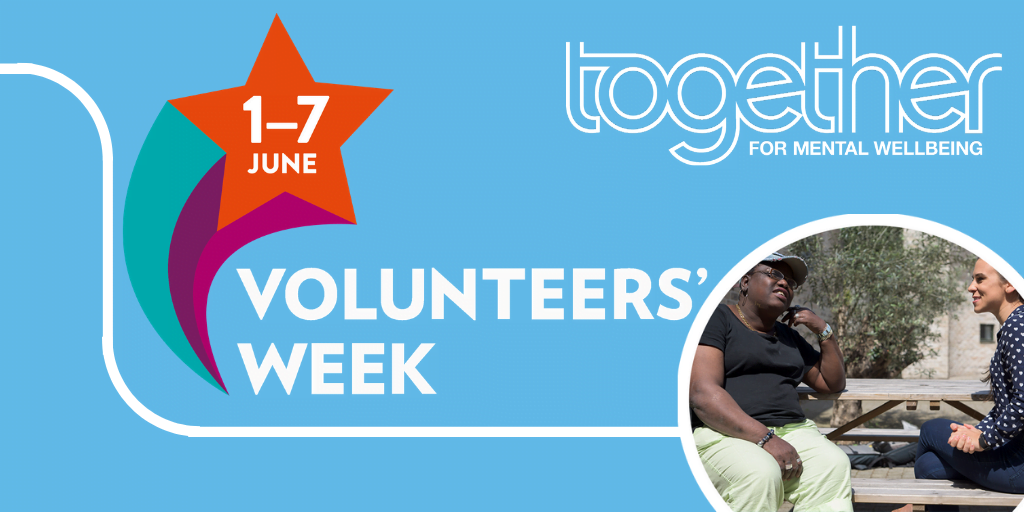Volunteers Week 2020 – Peer supporters Ruth, Maggie and Lena share their lived experience of volunteering

Continuing our Volunteers Week 2020 coverage, three more of our peer support volunteers have been kind enough to share their lived experience of that and what it has meant to them. We’re incredibly grateful to all our volunteers who play a vital role in the support we provide to people living with mental distress.
First up peer supporter Ruth who volunteers with our West Hampshire Housing and Support Service describes how volunteering has helped with her self esteem and confidence and how the support of her manager and the fact she has lived experience herself has contributed to that:
I’m currently a Peer Supporter with Together and have been volunteering for around 4 years now. I have volunteered for a few charities in various roles and also as Peer Supporter, but think that the model that Together use is by far the most beneficial for both peer supporters and their clients. The fact that peer support is coordinated by someone with lived experience gives peer support the defining role it has. I had been very unwell when I first started volunteering and am now working part-time as a mental health worker; this is definitely due to my confidence and self-esteem being built by my peer support work. It’s not only the clients of peer support who benefit but us as Peer Supporters gain too. My coordinator Danielle River has been a huge inspiration to me, has supported me throughout and has given me strength and guidance for which I am hugely grateful. Together are a great employer and have helped me by giving Danielle the ability to support me when I have needed it.
My passion for peer support is non-questionable; it’s something I strive to encourage as much as possible. I can’t advocate enough the benefits of this service. I’m a prime example of how much peer support has helped me to better manage my mental health. Together are a driver of this service and have demonstrated a real focus on the person’s individual needs; what the client says they want, not what we think they might need. Danielle has shown determination throughout to help me deliver this service to our clients and has been the force that I have used to guide our service as best I can. I truly hope that the service continues to grow and further develop and that I continue to be part of it.
Next up peer support volunteer Maggie who also supports our West Hampshire Housing and Support Service explains
I began working as a volunteer with Together in 2016; first of all as a Recovery Assistant working in one of the hubs where I chatted to clients and helped them with mainly practical jobs. Later on, I became interested in Peer Support as I was finding that chatting to clients and sharing different parts of our lives and my own mental health difficulties seemed to be a really good way of connecting with them and really seemed to help them. I’ve been a Carer for a family member for over 31 years and have managed my own mental health problems for the last 50 years. I feel that these skills really help me in my role. Really though; it’s just listening, care and kindness.
The Peer Supporter training I went on before starting the role was invaluable in helping me to understand the types of things I would be doing. I’ve supported clients on a one-to-one basis and have also facilitated groups within the hubs. One-to-one work is really personal; most of what I do is listening, but I also share bits of my life and my experiences of poor mental health.
Just listening to people and letting them feel heard is really important to me. I really enjoy connecting with a person and supporting them through their difficulties. It makes me really happy when a client is recovering and moving forward with their life, even though they still really struggle some days. It can be distressing occasionally, when a client is really poorly, but so lovely when you see them start to feel better.
I feel grateful for the trust I have built with the clients I’ve worked with and the work makes me feel proud of myself. Being a Peer Supporter has helped me gain confidence within myself. It’s also given me a really valuable insight into what paid work looks like in a mental health environment. It’s made me realise that this is something I would like to go into in the future. To anyone considering becoming a Peer Supporter, I would really encourage them to give it a try. You don’t only learn about other people, but also gain valuable insight into yourself.
Finally also sharing what the experience of volunteering has been like is Lena Walsh who describes the way volunteering within advocacy sessions in Together’s Wakefield Advocacy Together Hub makes her feel and the way it has helped her to develop:
 I am always trying to help people wherever I am because it gives me a warm glow of happiness inside when others are happy. It makes me feel like I actually contributed to helping someone when they needed it most and it forms a human connection. This way I am able to form alliances and more so increase my learning of others’ needs. Being a volunteer has taught me how to build on my social skills through communication and understanding. It has also helped with development of my problem solving and my empathy skills. Throughout my volunteering time I was able to learn work related skills and vital planning skills. I am able to further broaden my learning experience in a different setting that will assist others’ needs.
I am always trying to help people wherever I am because it gives me a warm glow of happiness inside when others are happy. It makes me feel like I actually contributed to helping someone when they needed it most and it forms a human connection. This way I am able to form alliances and more so increase my learning of others’ needs. Being a volunteer has taught me how to build on my social skills through communication and understanding. It has also helped with development of my problem solving and my empathy skills. Throughout my volunteering time I was able to learn work related skills and vital planning skills. I am able to further broaden my learning experience in a different setting that will assist others’ needs.


